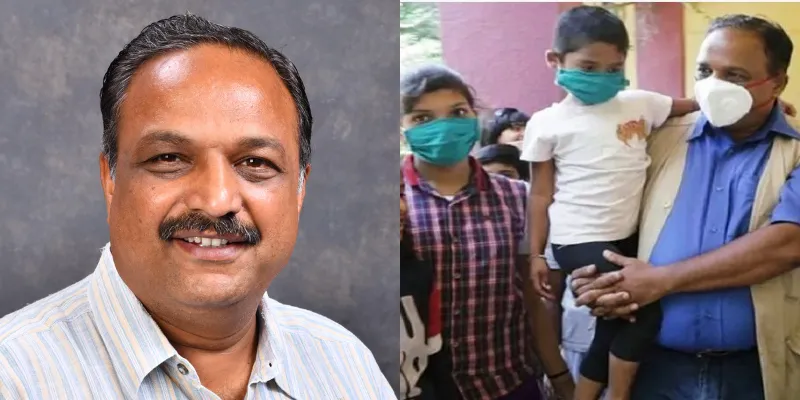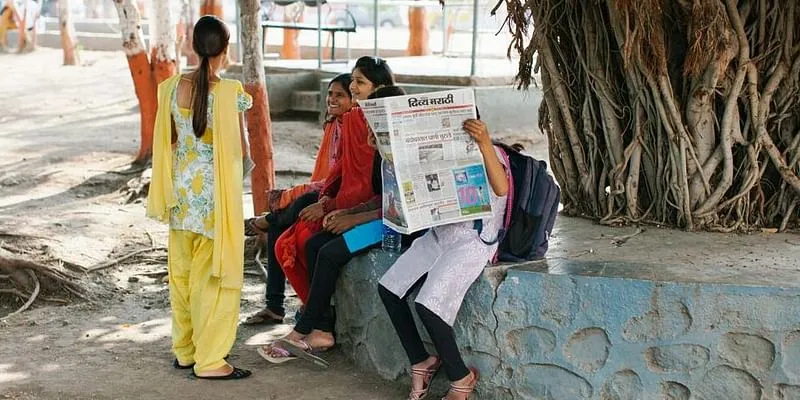Meet Girish Kulkarni, who is empowering sex workers and educating their children
Through his NGO, Snehalaya, Girish Kulkarni executed his lifelong mission of serving the underserved, and helps sex workers in the red light areas overcome their struggles.
Born into a lower-middle-class family in Maharashtra, Girish Kulkarni was surrounded by family members who contributed to India’s freedom struggle. From a very young age, he was introduced to many inspiring social workers and leaders who followed Gandhian principles.
Both teachers, Girish’s parents prioritised education and sent him for mathematics tuition classes in Class VIII. The shortest route to the class was through Chitra Galli, one of the red light areas in Ahmednagar, Maharashtra. During one of his walks, he came across a girl of his age who was being beaten by local goons because she had an STD and could not be forced into sex work.
“It was a horrifying sight for me to see a girl of my age being tortured. At that time, I asked myself if I should just think about doing something that can help girls like her,” Girish shares with SocialStory.
Soon, Girish joined college where he made several friends, one of whom lived in the red-light area. He was too embarrassed to invite Girish and the others to his place, but once he did, Girish was shocked to find out that his mother, sister and grandmother were all into sex work. As much as he wanted to help, Girish knew he couldn’t.
Inspired by how Mahatma Gandhi served the poorest of the poor, Girish began imbibing those principles in his life as well. He volunteered at many places and was a social activist working for many causes. Despite his efforts, he felt that he needed to help those women in the red-light area who were struggling to live a life with dignity, unable to leave their profession.
In 1989, he founded Snehalaya, an NGO that works in the verticals of education, healthcare, rehabilitation, awareness, and campaigns.

Girish Kulkarni with the children of Snehalaya
The story of Snehalaya
Girish shares that people mostly had negative perceptions about sex workers. He says that most people at the time believed that they were in the job because it was easy money to curb their addiction. But that was far from the truth.
“The women were not treated well, and were raped and tortured very often. Their earnings were meagre, not even enough to feed their children,” he says.
He then went to these areas in Ahmednagar to understand the situation of these women, and also teach them about addiction and how to overcome it. He realised that most of the women’s earnings were taken away by ‘brokers’ and pimps, who gave them as little as Rs 10 per customer.
“Even if she serves 10 customers in a day, she wouldn’t make enough to feed her children,” he notes.
One day, he came across a 16-year-old girl who had two children – one back home and one three-year-old son who stayed with them. She requested Girish to help her child since she didn’t want a similar fate for them, having been brought into sex work at the age of 13.
That’s when he decided to provide basic education to the children and started Snehalaya. He started with two children and within two months, began teaching 80 children from different red-light areas in India when he was just 19 years old. He also provided them with snacks and told them stories to keep them occupied.

'Balbhavans' are present in 8 slums and are impacting about 2000 children.
What was supposed to be a small project began a lifetime commitment for Girish, and Snehalaya was officially registered in 1991. A few of his friends who had joined initially, left the NGO because to go their separate ways. So, Girish thought, “why should we only work for them when we can work with them?”
He employed three sex workers as Trustees; one of them had been a government employee who, by a stroke of bad luck, ended up in a brothel. This opportunity gave the women a sense of empowerment and dignity.
While he began educating children from several brothels, there were times when he couldn’t see light at the end of the tunnel. Once, several women had escaped a brothel, unable to stand the torture inflicted by the customers. However, they left their children behind. Not knowing what to do with them, the brothel owners approached Girish to take them.
“I wanted to help them and was ready to give them shelter, but they refused to give up the girls because they wanted to drag them into sex work,” Girish says.
Girish, who refused to only take boys, took all the children home. But even at home, his parents, despite being supportive, said they couldn’t take care of the children by themselves. So, he hired some of the sex workers over the age of 60 to take care of them.
Education, healthcare, and creating awareness
Girish soon got a piece of land for Snehalaya and constructed a home for the beneficiaries who came from many red-light areas in India. The NGO works with 23 projects in five different verticals of education, healthcare, rehabilitation, awareness, and campaigns. The main beneficiaries are women, children, and members of the LGBTQIA+ community – who fall prey to poverty and the commercial sex industry.
The NGO serves the poor and provides various healthcare facilities, including a ‘Caring Friends’ hospital which treats HIV/AIDS and other infectious diseases. Through the ‘Smile Project’, the NGO has provided vocational training and menstrual hygiene through a sanitary pads production unit.

Children of Snehalaya's rehabilitation centre
Girish also created awareness about unprotected sex and related STDs, and also distributed condoms to the women. “In fact, in 1992, despite the quality condoms being uncomfortable for the women, they agreed to do it because of the bond we had built over the years,” says Girish.
Snehalaya has also conducted various campaigns, including the Malala Fund (a campaign for equality in education) and Her Voice (standing up against gender equality), among others.
Most of Snehalaya’s projects are now run by children who were raised in red-light areas.
Creating widespread impact
The NGO has partnered with various organisations like Toybank, Wishing Well, Arpan Foundation, Bajaj Finserv, and others that have fuelled the organisation’s growth, and helped improve the reach of its work. Snehalaya also receives active donations from several donors across the world.
“About 65 percent of the donations come from individuals, and the rest comes from corporate funds and CSR initiatives,” Girish says.
“But the initial donations from the sex workers, who would give a part of whatever little they earned for the development of the NGO,” he adds.
Apart from Snehalaya, Girish also works as a professor in one of the colleges in Maharashtra, and is also a PhD scholar. But the beneficiaries believe in the ‘doctor’ in Girish for health issues, more than doctors who’ve completed their medical studies.

The children of Snehalaya
“I am a teacher by profession, but have become a doctor, a barber, and even a tailor in some cases,” Girish laughs, adding, “But it is gratifying to see their trust in me and our organisation.”
Functioning for over 30 years, Girish has faced several challenges, especially social stigma.
Despite having a supportive family, Girish says that his neighbours would often ask him why he didn’t choose any other social sector. Many people would often make fun of his efforts, saying that Girish would find ‘entertainment’ in these areas.
Girish would always brush away such stigma and redirect their sardonic statements back at them. To him, he had found a purpose in protecting this underserved community.
“We have about 65 crore young Indians, and if each of them chooses one underserved section of the society, things can look very different for India. We may not see a drastic change immediately, but we surely can create hope for change,” Girish signs off.
Edited by Kanishk Singh


![[Survivor Series] For Rs 160, customers could do whatever they liked to me for an hour](https://images.yourstory.com/cs/5/f5a7f3304b1211e9b6645b8ae897d03e/SS1-1613966025545.png?fm=png&auto=format&h=100&w=100&crop=entropy&fit=crop)






